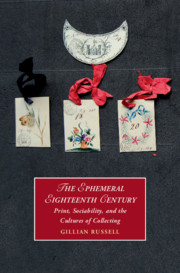Book contents
- The Ephemeral Eighteenth Century
- Cambridge Studies in Romanticism
- The Ephemeral Eighteenth Century
- Copyright page
- Dedication
- Contents
- Figures
- Acknowledgements
- Introduction
- Chapter 1 Accidental Readings and Diurnal Historiographies
- Chapter 2 Making Collections
- Chapter 3 The Natural History of Sociability
- Chapter 4 Sarah Sophia Banks’s ‘Magic Encyclopedia’
- Chapter 5 ‘Announcing Each Day the Performances’
- Chapter 6 Transacting Hospitality
- Chapter 7 England in 1814
- Conclusion
- Bibliography
- Index
- Cambridge Studies in Romanticism
Chapter 2 - Making Collections
Enlightenment Ephemerology
Published online by Cambridge University Press: 13 August 2020
- The Ephemeral Eighteenth Century
- Cambridge Studies in Romanticism
- The Ephemeral Eighteenth Century
- Copyright page
- Dedication
- Contents
- Figures
- Acknowledgements
- Introduction
- Chapter 1 Accidental Readings and Diurnal Historiographies
- Chapter 2 Making Collections
- Chapter 3 The Natural History of Sociability
- Chapter 4 Sarah Sophia Banks’s ‘Magic Encyclopedia’
- Chapter 5 ‘Announcing Each Day the Performances’
- Chapter 6 Transacting Hospitality
- Chapter 7 England in 1814
- Conclusion
- Bibliography
- Index
- Cambridge Studies in Romanticism
Summary
Chapter 2 explores the interest of figures such as George Thomason, Anthony Wood, and Narcissus Luttrell in the paraphernalia of texts that subsequently became classified as ephemera single-sheet ballads, advertisements, pamphlets, and tickets. This interest is linked with the development of early Enlightenment associational culture and the importance of such kinds of print in catering to and archiving the quotidian, sociable life of the developing public sphere. I discuss how such material was archived and preserved in the form of ‘collections’ and in the last section of the chapter outline how such ephemera books were important in literary history, Romantic-period bibliography, and also the idea of a repository of the archives of the nation, a public records office, as represented by William Godwin’s interest in the Thomason tracts.
Keywords
- Type
- Chapter
- Information
- The Ephemeral Eighteenth CenturyPrint, Sociability, and the Cultures of Collecting, pp. 60 - 97Publisher: Cambridge University PressPrint publication year: 2020

